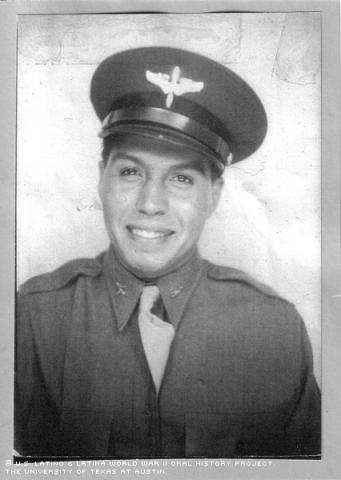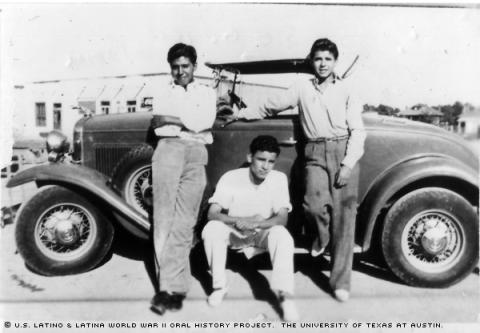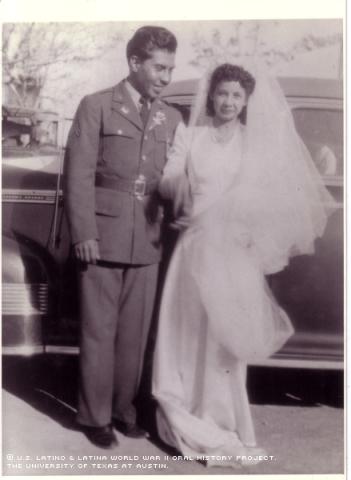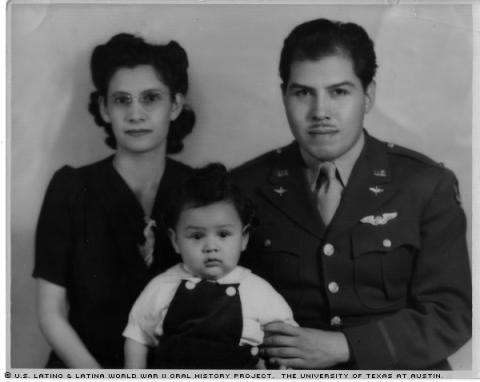



By Brandi Grissom
Only one street led into and out of the poor barrio in El Paso, Texas, where Pablo Segura grew up during the Great Depression of the 1930s.
Segura was determined to follow that street out of the barrio, and believed education was key to achieving his goal. Through his service in the military during World War II, he believes he fulfilled his dream.
After graduating from high school in 1935, Segura put aside his college ambitions and left El Paso for California to look for work to help his family through the economically trying times.
"I got on a freight train and went to California -- the promise land -- to get a job," he said.
The promise land didn’t prove to be as fruitful as Segura hoped. After a disappointing job search in California, he joined the Civilian Conservation Corps (CCC) in Pima, Ariz., and worked on soil conservation projects.
President Franklin D. Roosevelt established the public works program in 1933 to provide employment for millions of unemployed young men during the Depression.
"We were supposed to get $30 per month," Segura said. "Twenty-five of it went to the families, and we kept $5 a month. We barely made it."
Meanwhile, Segura's mother was saving the money he sent her to help pay for his college enrollment to earn a degree in engineering at what is now the University of Texas at El Paso (UTEP). He enrolled in 1936.
"Mother was a very frugal woman. She saved and saved," Segura said. "She had saved $150, and with $150 I went two semesters to the Texas College of Mines and Metallurgy. It's now UTEP."
With Segura's college funds depleted in 1938, he returned to the CCC when he heard the program was sending high school graduates to college. However, he soon learned he was ineligible to receive aid, as he had already attended one year of college.
"I found out by joining the Texas National Guard you could get money every time you drilled, and you drilled once every week," Segura said. "I was saving that money to go back to college."
On Nov. 25, 1940, the Texas National Guard was mobilized into federal service and became part of the U.S. Army.
Segura and the members of Company E, 141st Infantry Regiment, 36th Infantry Division, were sent five weeks later to Camp Bowie, near Brownwood in Central Texas, to begin combat training.
"We went to Brownwood, and it was just cantonments, tents that were half wood and half canvas," Segura said. "We had to go through six weeks of basic training. Those of us who had been in the CCC didn't have any trouble adjusting to Army life."
Segura's troop, Company E, was composed entirely of Latino men. All of the non-commissioned officers were fluent in English and Spanish. Many native-born and legal U.S. residents who spoke only Spanish were drafted into the company, Segura wrote in a letter to the Project after his interview.
"We trained a lot of recruits from Texas that didn't speak English," said Segura during his interview. "We were the only 100 percent Mexican American company in World War II. We made a name for ourselves."
Despite having made a name for themselves as valuable American soldiers, Company E wasn’t held in such high esteem by the Brownwood community, according to Segura.
"We had a lot of discrimination," he said. "We used to go downtown and ask for a Coke, and they wouldn't serve us. They said, 'No, you're still Mexican.'"
In his letter, Segura recalled that this would occur in spite of wearing their Army uniforms.
Even within the military, Segura says Latino soldiers often faced challenges because of their heritage. Segura applied for Officers Candidate School in an effort to escape the discrimination he experienced in Brownwood.
"I had to take an oral exam.
They said, 'No, you can't go to OCS.'
I said, 'Why?'
And they said, 'You have too much accent.'"
From Camp Bowie, Segura was transferred to Camp Blanding, Fla., in 1942. Many of the recruits in Florida were from Kentucky, Ohio and New York.
"We got along better because they had never intermingled with Mexicans before," Segura said. "They didn't even know what a Mexican was."
While he was stationed in Florida, Segura took and passed the exam to get into the Army Air Corps. This exam also included an oral portion.
Segura recalled in his letter that the same major in the 141st Infantry Regiment who’d rejected him for OCS called him in.
"I asked if my accent had improved this much in only six months.
He said, 'You better get the hell out of here while you're still a corporal,'" Segura recalled.
In the Army Air Corps, Segura was trained as a navigator. Out of 200 cadets in his class, he was the only Latino. He received his "wings" as a navigator and was commissioned a second lieutenant on May 1, 1943.
Unfortunately, Segura lost his hearing that same year while working as a navigator at Biggs Air Field in El Paso.
"I was teaching a new navigator how to fire [aircraft weaponry] when my ear drums got busted," Segura said. "I kept flying and damaged my nerves more. When one pilot reported me, I had to go to the flight surgeon. He grounded me, and I was sent to Randolph Air Force Base" in San Antonio, Texas.
After being treated at the hospital, Segura recovered a portion of his hearing with the help of hearing aids. He returned to El Paso and became an emergency procedures instructor at Biggs, teaching aircrews survival tactics. He also served as an interpreter.
Segura spent two years at Biggs before his ears once again sent him to the hospital. He spent the final three months of his service time hospitalized, getting officially separated from the Army Air Corps Jan. 11, 1946, at the rank of Lieutenant. He earned a Good Conduct Medal and Rifleman Medal for his service.
In 1946, Segura returned to the Texas College of Mines and Metallurgy in El Paso and received his engineering degree in 1949.
He and his wife, Juanita Roque Segura, whom he met at a dance in 1939, were married Dec. 23, 1941. They moved their family, including sons Ricardo, Oscar and Edward, to Houston in 1950. A daughter, Ester, was born in Houston in 1956.
Segura worked as a metallurgist until his retirement at age 63 in 1980.
He’s an active member of the Houston chapter of the League of United Latin American Citizens (LULAC), serving as the chapter's president in 1974.
From his experiences in the military and his relentless efforts to better himself through education, Segura says he has this to impart to his Mexican American brothers and sisters:
"You don't have to lose your roots to be a proud American."
Mr. Segura was interviewed in Houston, Texas, on September 9, 2002, by Paul R. Zepeda and Ernest Seguia.

